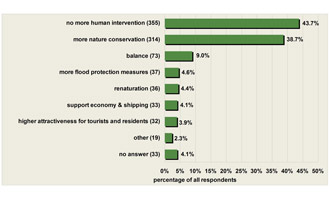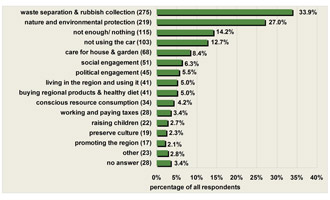

Disclaimer:
The authors are solely responsible for the content of this report. Material included herein does not represent the opinion of the European Community, and the European Community is not responsible for any use that might be made of it.
Back to overview reports
Even though the respondents seem reserved with respect to participation in official planning and management processes, they have a clear view of the future they would like for the Elbe and are active and creative in working towards these aims. For the future, residents want human intervention to stop (43.7%) (see Fig. 7) and nature conservation to become more important (38.7%). 9% of all interviewees are keen to find a balance between nature conservation and economic development. Altogether about 10% of the respondents want more intervention such as strengthening flood protection measures, supporting economic development or expanding infrastructure.
More than 80% of all the people surveyed already contribute to the preservation of their Heimat; and they do so in many different ways. The answers present a wide range of ideas and possibilities, such as waste separation and rubbish collection (33.9%) (see Fig. 8), engagement in nature conservation and environmental protection (27%), not using the car (12.7%), social (6.3%) or political (5.5%) engagement and promoting the region (2.1%). These answers demonstrate that the intention to become actively involved in the development of the region is present. However, official planning processes seem to be inscrutable for outsiders, and there is insufficient trust between authorities and the public. A way must be found to overcome people’s fear of not being qualified enough to engage more in official processes.
Back to top
How can public acceptance for management actions be increased?
How can public awareness regarding estuaries be evaluated (Elbe case)?
The tidal Elbe - a people's perspective
Table of content
5. 5. Public Participation
Only 9.6% of all respondents participate in planning and management processes for the region. Reasons for not engaging are lack of time and listlessness, but also lack of knowledge and the feeling of not being qualified enough. The interconnectedness of all kinds of processes within the region seems to be too complicated even for experts to fully understand. At least 36% of all interviewees stated they would like to be asked by authorities to be involved. This is potential that could be tapped.Even though the respondents seem reserved with respect to participation in official planning and management processes, they have a clear view of the future they would like for the Elbe and are active and creative in working towards these aims. For the future, residents want human intervention to stop (43.7%) (see Fig. 7) and nature conservation to become more important (38.7%). 9% of all interviewees are keen to find a balance between nature conservation and economic development. Altogether about 10% of the respondents want more intervention such as strengthening flood protection measures, supporting economic development or expanding infrastructure.
More than 80% of all the people surveyed already contribute to the preservation of their Heimat; and they do so in many different ways. The answers present a wide range of ideas and possibilities, such as waste separation and rubbish collection (33.9%) (see Fig. 8), engagement in nature conservation and environmental protection (27%), not using the car (12.7%), social (6.3%) or political (5.5%) engagement and promoting the region (2.1%). These answers demonstrate that the intention to become actively involved in the development of the region is present. However, official planning processes seem to be inscrutable for outsiders, and there is insufficient trust between authorities and the public. A way must be found to overcome people’s fear of not being qualified enough to engage more in official processes.
Important to know
Reports / Measures / Tools
| Report: | Management measures analysis and comparison |
|---|
Management issues
How can communication between public-administration-science be increased?How can public acceptance for management actions be increased?
How can public awareness regarding estuaries be evaluated (Elbe case)?

